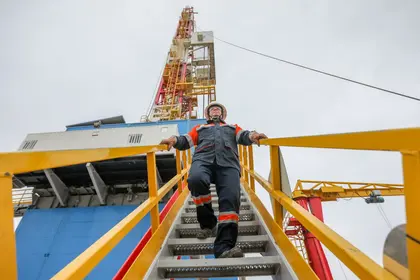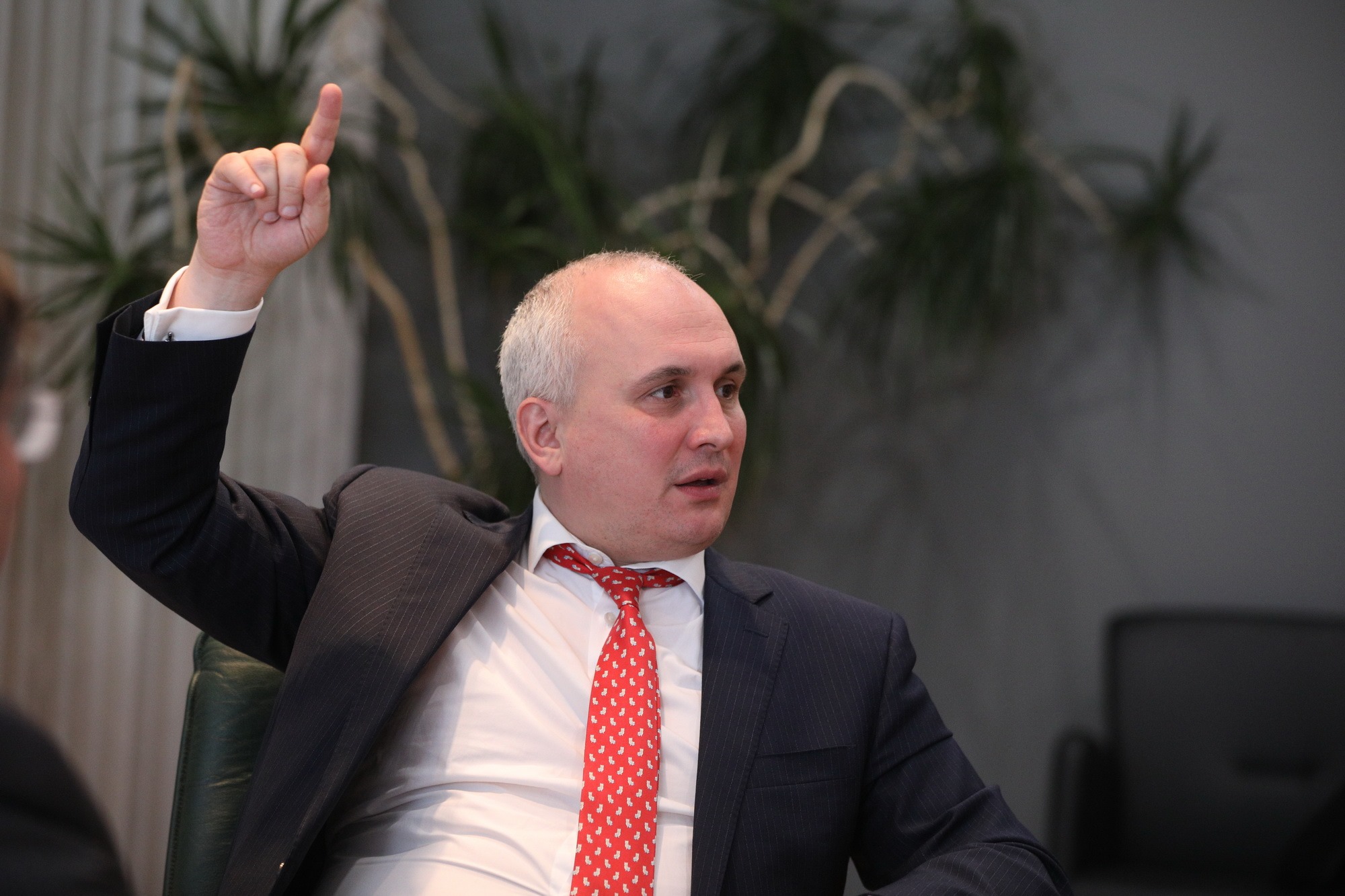Ukraine’s reserves of natural gas are 13 times higher than domestic annual demand. Yet the country has to satisfy one-fourth of that demand with imports, which undermines its national energy security.
The country has at least 350 billion cubic meters of natural gas buried deep inside its soil, but it manages to extract just over 20 billion cubic meters annually, falling short of demand by at least 6 billion cubic meters — and historically much more — yearly.
In fact, the country has not been able to meet that demand without importing any gas for the last three decades, even though domestic demand fell from 118 billion cubic meters in 1991 to 26 bcm today.
Industry players led by the state have been exhausting the same resources for years, investing very little in the extraction and adopting investor-unfriendly policies. For some time, it was simply easier to import gas from Russia.
“Ukraine’s gas industry has not received enough attention for many years,” said Artem Petrenko, executive director at the Association of Gas Producers of Ukraine. “The country was focused on gas imports, but not on encouraging the development of its own gas production.”
- Politicians & oligarchs
Ukraine’s gas production industry relied heavily on Ukrainian oligarchs, who were able to easily get exploration licenses for gas fields by taking advantage of their close ties with state officials. Meanwhile, other market players, including international companies, hardly stood a chance.
In 2018, nearly 80% of natural gas in Ukraine was produced by UkrGasVydobuvannya — a subsidiary of state-owned oil and gas giant Naftogaz — and by Ukrnafta, controlled by billionaire oligarch Ihor Kolomoisky.
Billionaire oligarch Rinat Akhmetov’s DTEK, pro-Russian businessman Vadym Novynsky’s Smart Holding, ex-Ecology Minister Mykola Zlochevsky’s Burisma and billionaire oligarch Victor Pinchuk’s Geo Alliance together produced the remaining 20%.
“It was an industry for a close circle,” said Andriy Gerus, the head of the energy committee in parliament. And it was a circle that wasn’t investing. “Oligarchs don’t like to invest in risky projects since there is a possibility that you spend $10 million and won’t find enough gas reserves,” Gerus explained.
Because of corruption, “foreigners haven’t felt comfortable working in such conditions,” Gerus said.
- Depletion
UkrGasVydobuvannya is Ukraine’s largest gas producer. In 2019, it extracted 14.9 billion cubic meters. Still, top officials have repeatedly criticized the company for failing to meet gas production targets set by the government — to produce 20 billion cubic meters by 2020.
And the situation will get even worse, says Andriy Favorov, who heads the integrated gas business at UkrGasVydobuvannya’s parent company Naftogaz.
Over 80% of the largest 16 wells operated by UkrGasVydobuvannya have already been exhausted and the pressure in these wells — an important indicator for gas extraction — has dropped to very low levels.
“It’s becoming very difficult and very expensive to get the gas out of the ground,” said Favorov. “We are running out of our reserves.”
One of the most challenging spots — and ironically the richest — is the Dnipro-Donetsk basin, where UkrGasVydobuvannya has been extracting gas for the last 70 years, Favorov says. The gas reserves there are coming to an end.
“We can’t continue to expect that the licenses that we obtained and developed in the 1950s are going to produce the same amount of gas in 2020,” said Favorov.
In addition, the national company only purchased modern drilling equipment last year. Previously, workers used obsolete well drilling machines made in the 1960s.
“It’s like asking a Zaporozhets car to fly to the Moon,” said Favorov, referring to the make of a low-cost two-door car produced in the Soviet Union.
In 2016–2018, UkrGasVydobuvannya spent around $1.6 billion on infrastructure, drilling and new equipment, something that the company hadn’t done in the past three decades.
The company also started to attract foreign companies, such as Canadian oil and gas company Vermilion Energy, and participate in tenders for production sharing agreements. However, Favorov still forecasts that UkrGasVydobuvannya’s natural gas production will fall by 27%, meaning that the firm’s output will only reach 14.6 billion cubic meters, instead of 20.1 billion expected in 2020.
Private companies will also face a similar problem: 20% underproduction this year.
- Overregulation
Many foreign companies have faced serious problems: They report difficulties in obtaining or renewing their licenses to extract gas here, and they suffer from outdated laws governing equipment procurement.
In 2017, for example, the State Service for Geology and Subsoil held only one auction for oil and gas blocks. Meanwhile, barely known companies received licenses for another 30 gas-rich sites without any auction. Many of those licenses were concentrated in the hands of so-called resellers, companies that acquire licenses in order to sell them at a higher price in the future.
“It was called a license famine,” said Amir Kilani, representative of the Xinjiang Beiken Energy Engineering natural gas drilling company from China.
Roman Opimakh, head of the State Service of Geology and Subsoil, agrees on the challenges: “It was difficult to come to the market and buy a ‘ticket’ in a transparent way.”
It was also difficult to renew already existing licenses because of local city councils. But Opimakh says government has started to impose transparent procedures. Just recently, for example, it ended one of the most notoriously corrupt areas: the awarding of licenses through local city councils.
“Finally, there is zero-tolerance for corruption in this agency,” said Opimakh.
Outdated post-Soviet regulations were also among major barriers until recently, according to Steve Baldwin, executive director at UkrGasVydobuvannya. “Procurement was very difficult in the sense that a national oil and gas company had to buy the cheapest. But the cheapest is not the best,” Baldwin said.
In addition, in 2018, Ukraine decreased the rent for new wells from 29% to 12% of the value of gas extracted from the wells with a depth to five kilometers and from 14% to 6% for gas from deeper wells.
“It is a positive moment,” lawmaker Gerus said. “But it hasn’t added any substantial growth so far.”

- Ambitious plan
UkrGasVydobuvannya’s strategy includes deeper drilling to find larger gas reserves under already existing fields, tight gas production and sea shelf exploration.
The primary goal of deeper drilling (down to six kilometers) is to search for more gas at the Shebelynka site in Kharkiv Oblast. Favorov says there is a 30% chance of finding immense gas reserves.
Secondly, UkrGasVydobuvannya plans to start the production of tight gas — the type of gas from a relatively impermeable reservoir rock. This hasn’t been done in Ukraine yet.
Favorov believes that hydraulic fracturing technology, or fracking, doesn’t have any adverse ecological effects and sees such claims as propaganda by competitors to preclude Ukraine from getting its natural gas to export markets.
However, according to Scientific American magazine, this technology requires huge amounts of water to be injected underground. For that reason, it can threaten local water supplies.
Previously, Greenpeace reported that the wastewater from fracking in the United States had been linked to livestock and family pet deaths across the country as chemicals used in this technology have negative effects on health and can even cause cancer.
Thirdly, if UkrGasVydobuvannya gets a license, the company plans to start developing the Dolphin oil and gas fields, roughly 9,000 square kilometers on the Black Sea shelf, which faces no obstacles from landowners.
“Dolphin for me is a driller’s dream. It’s a massive block, the one we’ve never seen before… It’s equal to 42 offshore blocks of the Gulf of Mexico and has massive potential,” said Baldwin.
At the same time, the Russian maritime fleet threatens, located 10–20 kilometers from where the company would like to start drilling.
“Obviously, the Russian Federation is not shy about violating all international laws,” said Favorov. “But we don’t have the luxury not to try. This is Ukrainian gas, these are Ukrainian opportunities and it’s something we need to do.”
You can also highlight the text and press Ctrl + Enter





